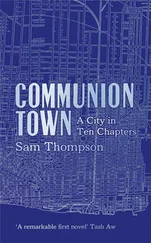Frank Tallis - Deadly Communion
Здесь есть возможность читать онлайн «Frank Tallis - Deadly Communion» весь текст электронной книги совершенно бесплатно (целиком полную версию без сокращений). В некоторых случаях можно слушать аудио, скачать через торрент в формате fb2 и присутствует краткое содержание. Жанр: Исторический детектив, на английском языке. Описание произведения, (предисловие) а так же отзывы посетителей доступны на портале библиотеки ЛибКат.
- Название:Deadly Communion
- Автор:
- Жанр:
- Год:неизвестен
- ISBN:нет данных
- Рейтинг книги:3 / 5. Голосов: 1
-
Избранное:Добавить в избранное
- Отзывы:
-
Ваша оценка:
- 60
- 1
- 2
- 3
- 4
- 5
Deadly Communion: краткое содержание, описание и аннотация
Предлагаем к чтению аннотацию, описание, краткое содержание или предисловие (зависит от того, что написал сам автор книги «Deadly Communion»). Если вы не нашли необходимую информацию о книге — напишите в комментариях, мы постараемся отыскать её.
Deadly Communion — читать онлайн бесплатно полную книгу (весь текст) целиком
Ниже представлен текст книги, разбитый по страницам. Система сохранения места последней прочитанной страницы, позволяет с удобством читать онлайн бесплатно книгу «Deadly Communion», без необходимости каждый раз заново искать на чём Вы остановились. Поставьте закладку, и сможете в любой момент перейти на страницу, на которой закончили чтение.
Интервал:
Закладка:
‘Natural? Perhaps it is natural for the human infant to have a presentiment of adult feelings. Perhaps this first great attachment to the mother is a form of rehearsal for future intimacies.’
‘If so, then it is a rehearsal relevant to only half the population! How does Oedipus’s situation translate with respect to the female child? As a father of two daughters I would be most interested to know.’
‘I am not sure that Professor Freud has given that question much consideration.’
Rheinhardt harrumphed and drew on his cigar, producing a flotilla of smoke clouds.
Liebermann ignored Rheinhardt’s disapproval and continued with his explanation: ‘Sprenger’s mother died in childbirth and absence — as we know — increases yearning. So it was that Sprenger’s love for his mother was intensified and his overestimation of her beauty — encouraged by his father’s insistence that she was an angel — was never tested against a fallible reality of flesh and blood. His longing knew no bounds. Idealisation was transformed into idolatry. In his childish mind, his father’s encomium became a psychological truth. She was not like an angel, she was an angel — with wings — the undeniable fact of their existence being supported by photographic evidence! Any young boy, bereft of his mother, would pine for her, want her back again. But Sprenger, knowing that he had been the cause of her death, desired her return with a depth of feeling that is difficult for us to appreciate. The notion of reunion offered the prospect of absolution: freedom from the guilt associated with his first — and most terrible — sin.’
The young doctor paused to take a sip of his brandy.
‘Sprenger mentions communing with his mother’s image,’ Liebermann continued. ‘It is worth noting that in our culture the idea of communing arises mostly in two contexts: the mystical and the carnal. We commune with God and we commune with lovers. Thus we can conclude that, even when Sprenger was very young, thanatos and eros were drawing closer together in his unconscious. I would also direct your attention to the fact that Sprenger’s father seems to have been jealous of his son’s communing. On discovering his son holding his wife’s photograph, we learn that he snatched the picture away. For young Sprenger, it must have been like being found in flagrante delicto.’
Rheinhardt raised his eyebrows.
Liebermann was unperturbed: ‘Sprenger’s precocious interest in death — as evinced by his desire to see the mummies in Vienna’s Natural History Museum — was merely symptomatic of his desire to be reunited with his mother. I also wonder if oblivion held some attraction for him, because it suggests a corresponding state — or non-state — before birth, the oblivion of the womb in which the unborn child is not only close to its mother but symbiotically joined.’
Liebermann lit himself another cigar.
‘I will summarise: firstly, all male infants experience feelings towards their mothers which presage the sensual longings of maturity; secondly, in Sprenger, these feelings were magnified by his peculiar circumstances; thirdly, Sprenger wished to be reunited with his mother; and, finally, Sprenger’s mother became “idealised” as an angelic being. These four factors — taken together — represent the cornerstones of Sprenger’s psychopathology.’
Satisfied with the first part of his exposition, Liebermann allowed himself a brief pause during which he enjoyed the woody flavours of his cigar. Rheinhardt waited patiently.
‘It is not difficult,’ said Liebermann, stirring, ‘to see how Sprenger learned to find corpses desirable. His nocturnal auto-erotic activities were undertaken while holding his breath and keeping very still — something he did initially to avoid waking his father. In due course, stillness became eroticised and incorporated into exploratory play with the village girls. When he saw Netti and Gerda in their caskets — perfectly still — he became acquainted with a level of arousal more intense than anything that he had experienced before. Thus Sprenger’s sexual interest was diverted by small degrees from its natural course to a most irregular destination. If Sprenger’s sexual development had progressed in the context of an otherwise normal life, he would have been no different to any of Krafft-Ebing’s necrophiliacs. But this was not the case. His sexual development occurred against the remarkable background I have already described. This combination raised him above the ranks of common deviancy. With the strengthening of his libido, his desire for communion with his mother gained urgency; however, even in Sprenger’s disturbed mind the universal taboo against incest necessitated a defensive transformation. To make such an ambition acceptable, his mother — already equipped with wings — became the Angel of Death. It was a metamorphosis that required little effort, and his fevered imagination supplied him with appropriate hallucinations: subtle intimations, auras of violet light, and the winged figure herself …’
Rheinhardt stubbed out his cigar.
‘Are you proposing,’ said Rheinhardt, his cheeks aglow with indignation, ‘that Sprenger killed women to satisfy an infantile wish to have intercourse with his mother?’
‘Ultimately — yes.’
‘I’m sorry, Max, this time …’ Rheinhardt shook his head. ‘This time you have followed your mentor into a quagmire. I have the greatest respect for Professor Freud, but-’
‘Oskar, how can you doubt it!’ Liebermann cried. ‘When Sprenger writes of his visit to the Cathedral of Notre Dame in Paris he mentions the portal reliefs. His attention was captured by Mary depicted not as Mother of God but as the bride of Christ. Do you not see? That was the turning point. Soon after, he resolved to summon the Angel of Death by commiting a murder. The portal inspired him to summon his bride. Mother and bride become one in his unconscious.’ Liebermann reached over and impudently snatched the notebook from Rheinhardt’s lap. ‘And what about this?’ He flicked through the pages with quick, impatient movements. ‘Oh, to be sheltered — once again — in the sanctuary of those great wings, which close around the soul with the tenderness of a mother suckling her newborn child? That is how Sprenger describes communing with the Angel of Death! Does that not strike you as odd? That he chooses to compare one of the most terrifying personifications in mythology to a mother suckling her newborn child!’
Rheinhardt offered a concessionary tilt of the head.
‘Yes, I must admit: that is a most peculiar sentiment to express — given the nature of the being he is describing.’
A lengthy silence ensued, during which Liebermann continued turning pages, intermittently pausing to reread certain passages. Rheinhardt observed his friend, the intensity of his expression and the stubborn set of his jaw.
‘This is interesting,’ said Liebermann, his voice sounding distant and absorbed. ‘Sprenger says that he was fond of Fraulein Babel. There was something about her that moved him to pity. Do you remember when we were at Fraulein Babel’s apartment? And I suggested that the perpetrator might have left the door open because he wanted to be caught. I think this passage confirms my hypothesis. Some residue of conscience was rebelling against his psychopathology and the effects of the toxin in his brain.’
‘Ah, yes,’ said Rheinhardt, his full baritone suddenly sounding abnormally loud. ‘I wanted to ask you about that. You have hitherto given me the impression that the lead oxide was very significant. Yet now you seem to be placing much greater stress on Sprenger’s Oedipal inclinations and his early sexual development.’
Читать дальшеИнтервал:
Закладка:
Похожие книги на «Deadly Communion»
Представляем Вашему вниманию похожие книги на «Deadly Communion» списком для выбора. Мы отобрали схожую по названию и смыслу литературу в надежде предоставить читателям больше вариантов отыскать новые, интересные, ещё непрочитанные произведения.
Обсуждение, отзывы о книге «Deadly Communion» и просто собственные мнения читателей. Оставьте ваши комментарии, напишите, что Вы думаете о произведении, его смысле или главных героях. Укажите что конкретно понравилось, а что нет, и почему Вы так считаете.












